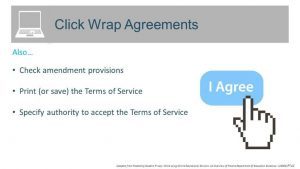Alert Message
 You might not realise it, but every day you’re on the internet, you’ll probably agree to an online contract, or use a service or website where you’re party to an existing online contract.
You might not realise it, but every day you’re on the internet, you’ll probably agree to an online contract, or use a service or website where you’re party to an existing online contract.
You might not actually read it, or sign it with your signature. But it is a contract nonetheless, and subject to the same conditions as any other contract—including the conditions that determine whether it is enforceable or not.
If it doesn’t meet those conditions, then it might not be enforceable. So as a business or consumer, it’s really important to understand how online contracts work—so you know how to make a good one, or to avoid being treated unfairly.
This is particularly important for businesses. If the court declares a term unfair and the business retains it in its contract, it’s liable to a fine of $200,000 for an individual, and $600,000 for a body corporate. A lot of money for words on a webpage—but all those words matter.
There are three distinct categories of online contracts.
So a lot of these contracts aren't even particularly obvious. Which brings us to the first potential problem with them.
Whether an online contract’s terms and conditions are enforceable usually depends on whether the consumer received adequate notice of those terms and conditions. A good example of this is the Uber case, Meyer v Kalanick, from the United States.

The Uber Case: Meyer v Kalanick
The United States District Court refused to enforce Uber’s online terms of service.
But this decision was overturned on appeal to the US Circuit Court of Appeals. One of the Circuit Judges said smartphone users would find the disclosures reasonably conspicuous, even on smaller screens.
It wasn’t enough that Meyer did not follow the hyperlink to the terms and conditions page. One Judge said: “While it may be the case that many users will not bother reading the additional terms, that is the choice the user makes”.
So, they held that Meyer did receive adequate notice of the terms and conditions of the online contract. This decision is not binding on any New Zealand court. However, it may provide guidance as to the approach that courts might take here.
New Zealand courts would likely consider the following questions when determining if an online contract is enforceable.
If you're a business drawing up an online contract, you should make sure you do all you can to meet this kind of standard of notice.
A New Zealand Court may also be called to consider whether or not the relevant term(s) sought to be enforced is "unfair", in the context of the Fair Trading Act 1986’s unfair contract terms provisions. This applies to all “standard form” consumer contracts—contracts that are offered on a “take it or leave it” basis without any opportunity to negotiate. This can include online contracts.
A term is unfair if three requirements are met:
But there's a fairly big complication to having a contract term declared unfair in New Zealand.
Unlike in Australia, New Zealand consumers themselves cannot apply to the court to have a contract term declared unfair—only the Commerce Commission can. A New Zealand consumer can lodge a complaint with the Commerce Commission to try and get the process started, but the decision to litigate or not remains with the Commission.
The legislation provides a non-exhaustive “grey list” of potentially unfair terms. The grey list includes some terms that are seen frequently in online contracts (such as those which limit a business’s liability or allow it to unilaterally change the terms of the contract).
But a term won't be automatically unfair just because it is on the grey list—it will still be subject to the three requirements referred to above.
As part of its consideration, a court must take into account the extent to which the term is transparent. So the court needs to think about whether the term is:
While a lack of transparency alone is not the sole indicator that a term is unfair, one-sided terms and conditions which are buried in a website may well be in difficulty.
The legislation also addresses terms that cannot be declared unfair. These include:
If you want your customers or website visitors to comply with any terms and conditions you set out, you should do all you can to make them obvious, transparent and fair - compliant with the Act's provisions. And if you change them, you must think carefully about how you communicate those to new and existing customers.
We’re here to help if you’re:
Give one of our experts a call or an email.

